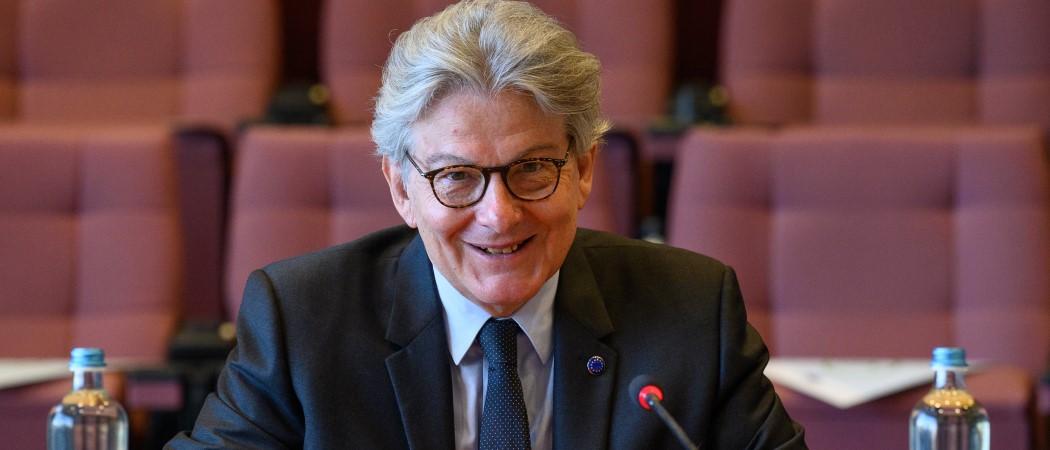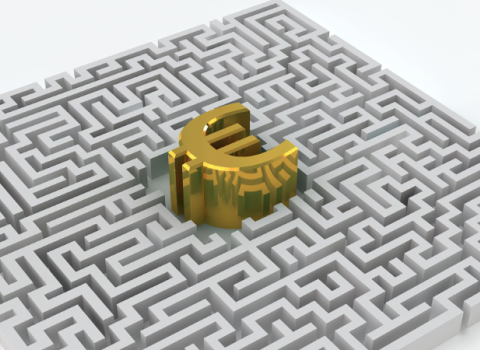Partnerships with industry worth €22 billion will boost research in AI, clean steel, sustainable manufacturing, zero-emissions transport and other industries

Thierry Breton, commissioner for internal market. Photo: European Commission
Eleven public private research partnerships got off the ground today, with a promised investment of €22 billion over the next seven years for the first bunch of Horizon Europe’s 49 proposed partnerships.
The partnerships will boost investments in research and innovation by pooling private and public resources to help the EU tackle big challenges on its road to carbon-neutrality, with an €8 billion contribution from Horizon Europe.
One big challenge will be decarbonising energy-intensive industries such as shipping and steelmaking. Meanwhile, in the EU‘s fight for digital sovereignty, a partnership on AI, data and robotics will instil ‘European values’ in these technologies.
“With the new partnerships Europe is coming at the forefront of global technological developments, building key industrial capacities and accelerating its twin green and digital transitions,” said Thierry Breton, commissioner for internal market. “This will help put Europe on a path towards climate-neutrality by 2050 and a circular economy.”
In one form of another, partnerships have been around since the inception of the EU research frameworks in 1984. They’ve always been controversial, with critics sceptical about billions of euros from the EU budget going towards projects where the rules are largely dictated by private companies.
In Horizon Europe, partnerships were thinned down from 120 to 49, to leave more room for bigger, more ambitious projects. The 11 co-programmed partnerships launched today are the first to get underway, with the rest will follow in the coming months and years.
With the first set of partnerships formally adopted by the Commission, the next step is signing the pact for collaboration next Monday, during the Commission’s the R&I Days.
Here’s the rundown of the eleven partnerships:
The European Open Science Cloud partnership will consolidate the work that’s been done in around 50 different projects since 2018 towards launching an open virtual space for research data. In the next decade, the Commission hopes, the cloud will serve two million European researchers.
The aim of the Partnership for Artificial Intelligence, Data and Robotics is to drive innovation, acceptance and uptake of these technologies while instilling them with European values. By the end of the decade, Europe should be a pacemaker in these technologies, according to the industry partners.
The European Partnership for Photonics, or light-based technologies, will speed up innovation in the field. This will help boost the competitiveness of Europe’s economy as photonics have applications in just about any industry from lighting and displays to manufacturing and health care.
Low Carbon Steelmaking will attempt to turn the energy-intensive steel industry into a carbon neutral one. This will in turn serve as a catalyser for other sectors, the Commission hopes.
Made in Europe will attempt to transform the manufacturing sector through climate neutral processes, adopting circular economy approaches and prompting a digital transformation.
In the process industries, Processes4Planet will work on delivering a green transformation. These industries are energy-intensive and will require renewable energy, green hydrogen, CO2 capture technologies and circular economy approaches to help industries such as petrochemicals, cement, aluminium and paper manufacture to be become climate neutral by 2050.
The EU also hopes to green the building sector. To do so, Built4People will work on developing low-carbon, energy and resource-efficient buildings and infrastructure.
In line with the EU ambition to develop its own batteries, the European Partnership for Batteries will create a European research and innovation ecosystem for batteries and foster European leadership in the design and production of batteries for stationary and mobile applications.
Three of the partnerships will bring the Commission and industry to the table to transform European transport. Taking a systems approach, 2Zero will work on developing zero-emission transport.
To help automate it, the partnership for Connected, Cooperative and Automated Mobility will pool resources for boosting innovation.
Meanwhile, the Partnership for Zero Emission Waterborne Transport aims to eliminate harmful environmental emissions, such as greenhouse gases, air and water pollutants, in maritime and inland waterborne transport.





 A unique international forum for public research organisations and companies to connect their external engagement with strategic interests around their R&D system.
A unique international forum for public research organisations and companies to connect their external engagement with strategic interests around their R&D system.